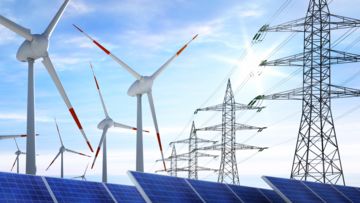The Energy Transition

The energy transition - An urgent need and a precious opportunity
July 2023 | 5 minute read | Marketing Communication
By Gilles Cutaya, Deputy Head of Marketing & Products at Amundi
The energy transition1 could provide a range of opportunities for investors who are aiming to generate positive returns while seeking to make a tangible contribution towards climate change.
Why is the energy transition being discussed more and more? There is no denying that climate change is one of the biggest challenges of our time. Scientists and experts continue to warn us about the negative effects of climate warming2. This is severely impacting the environment and biodiversity, as well as damaging populations and increasing inequalities.
It is important to find workable solutions to these issues: one solution could be energy transition. As investors, we seek to support this transition through increased investments in renewable energy sources and by supporting the transition of the economy through engagement in an attempt to contribute to the Global Net Zero Objective by 2050.
What is driving the energy transition?
Achieving energy transition on a global scale is a challenge, which will require joint efforts and a clear and actionable roadmap.
The most pressing need driving this shift to clean energy is addressing climate change. For decades, the progress and wellbeing of our societies have been the primary goals for governments and civil societies together, with less regard to the environmental impact of industrialisation. Now the situation is far different. Extreme weather events are now more common than in the past3, leading to human casualties and billions in economic losses. Greenhouse gas (GHG) emissions have reached an all-time high4, contributing to rising temperatures.
The need to ensure energy security5 is also an important aspect to consider. Recent geopolitical tension has reminded us that the lack of diversification in terms of energy supplies may put economies in danger. We have witnessed, particularly in the last year, a substantial rise in oil & gas prices, which has in turn contributed to an inflation hike. Achieving a better energy mix, with a higher share of renewable sources, could limit this aspect, making countries less prone to sudden supply-driven shocks.
As an example, the acceleration of the transition to clean energy, diversification of energy sources and energy savings are the three pillars of the “REPowerEU plan”6, setting a series of achievable goals to reduce the EU’s dependency on Russian fossil fuels by 2030.
The benefits of the energy transition
There are a number of benefits that can be achieved from the energy transition.
It is believed that cleaner energy sources may support economic growth. Estimates7 show how 58.3 million new jobs could be created in a wide array of sectors, such as energy efficiency, power grids and hydrogen. Renewable energy, one of the key segments for the energy transition, attracted over $366bn in investments in 2021, up 6.5% from 20208. Additionally, the potential economic payback of accelerating renewable development and efficiency measures has been estimated to be between 200-700% through 20309.
Interest is rising in different markets, as not only developed economies are looking at investments in renewables. In 2022, China was the first country in the world to attract clean energy investments with $546bn in investments. That’s over four times the US with $141 bn10.
As a connected aspect, the energy transition will likely spur technological advancement and innovation in a number of key areas. For instance, artificial intelligence, big data and the internet of things could amplify the transformation of the power sector, allowing the management of large clusters of data and optimising complex systems11. The demand for these technologies should also support investment in R&D, hence leading to a virtuous cycle.
There are also other benefits connected to the energy transition. A reduction in carbon emissions leads to better air quality, which could directly improve people’s health12. Furthermore, we could witness a lower frequency and intensity of extreme weather events, such as storms, droughts, tropical cyclones and heavy rainfall13. Similarly, crops would be less likely to be destroyed by immediate changes in weather, thus enhancing food security and diminishing the risk of local species being lost or going extinct.
The need for funding
The energy transition will require policy actions by governments as well as massive investments to finance it.
As part of the UN Sustainable Development Goals14, ensuring access to clean and affordable energy is as one of the priorities for our societies. A number of actions have already been realised, but more still needs to be done. If global investments in energy transition technologies reached a record high of $1.3trn in 2022, it should quadruple to over $5trn a year15 to limit the global temperature rise to 1.5°C, leading to a cumulative amount of $44trn by 2030.
These figures show that there is an enormous demand for capital, which will require private investments. In our opinion, asset managers that are involved in the funding of the energy transition could achieve a valuable opportunity. In our opinion, thematic solutions can help finance the energy transition.
By focusing on some of tomorrow’s potential winners of the energy transition, there could be the potential for achieving the benefits of more long-term growth trends and opportunities. Another aspect could be the diversification* potential, as thematic investing can represent a specific style that goes beyond the traditional approaches.
*Diversification does not guarantee a profit or protect against a loss.
Why Amundi – your thematic partner ?
At Amundi, we have been engaged in this debate and supported the energy transition since our inception in 2010. Furthermore, we have been developing innovative thematic solutions for more than a decade, and we believe that energy transition is a key pillar that will not only shape the future but also seeks to provide investment opportunities.
Amundi’s commitment towards ESG and Responsible Investing started in 2010 and it is reflected in our 2025 ambition plan16, which focuses on strengthening our offer in responsible investing, deepening the integration of ESG in investment solutions and setting internal objectives in line with international commitments.
In conclusion, climate change, amongst other challenges, is pushing us to rethink our relationship with energy. The energy transition could be a key to unlock a sustainable future, but substantial funding is needed. For this reason, financial players will be in a prominent position, and those who decide to invest in this shift could be better positioned to mitigate risk and seize opportunities.
Looking ahead, the transition towards a low-carbon economy will likely take time to materialise and show its effects, but it is driven by the urgent need for a meaningful paradigm change.
The path requires a collective effort, as organisations will need to collaborate with clients, governments, regulators and the civil society as a whole - we each have a role to play.
For more information on Energy Transition at Amundi click here: https://www.amundi.com/globaldistributor/Local-Content/Thematic-Investing/Environmental-Challenges
Sources
1The energy transition refers to the global energy sector’s shift from fossil-based systems of energy production and consumption — including oil, natural gas and coal — to renewable energy sources like wind and solar, as well as lithium-ion batteries, S&P Global, What is Energy Transition?, 24 February 2020
2World Meteorological Organization (WMO)- State of Climate in 2021: Extreme events and major impacts, 31 October 2021
3International Energy Agency (IEA), CO2 Emissions in 2022, IEA, Paris https://www.iea.org/reports/co2-emissions-in-2022, License: CC BY 4.0
4According to the International Energy Agency (IEA), energy security is defined as the uninterrupted availability of energy sources at an affordable price
5COM/2022/230 final - Communication from the Commission to the European Parliament, the European Council, the Council, the European Economic and Social Committee and the Committee of the Regions REPowerEU Plan, 18 May 2022
6International Renewable Energy Agency (IRENA) – World Energy Transitions Outlook 2022
7BloombergNEF, Global Investment in Low-Carbon Energy Transition Hit $755 Billion in 2021, 27 January 2022
8IRENA, Global Renewables Outlook: Energy transformation 2050, April 2020
9BloombergNEF, Global Low-Carbon Energy Technology Investment Surges Past $1 Trillion for the First Time, 26 January 2023
10IRENA, Digitalisation, https://www.irena.org/Energy-Transition/Innovation/Digitalisation
12NASA’s earth science team, Reducing Emissions to Lessen Climate Change Would Yield Dramatic Health Benefits by 2030, 30 November 2021
13A. Hartley, What are the benefits of reducing global CO2 emissions to net-zero by 2050?, 24 November 2021
14United Nations, Sustainable Development Goals, https://sdgs.un.org/goals
15IRENA, Investment Needs of USD 35 trillion by 2030 for Successful Energy Transition, 28 March 2023
16Amundi, ESG Ambition 2025: Amundi strengthens its ambitions for a fair environmental transition¸ September 2021 available at: https://www.amundi.com/globaldistributor/Responsible-Investing/Amundi-s-ESG-Ambition-2025
Important Information
Unless otherwise stated, all information contained in this document is from Amundi Asset Management S.A.S. and is as of 9 June 2023. Diversification does not guarantee a profit or protect against a loss. The views expressed regarding market and economic trends are those of the author and not necessarily Amundi Asset Management S.A.S. and are subject to change at any time based on market and other conditions, and there can be no assurance that countries, markets or sectors will perform as expected. These views should not be relied upon as investment advice, a security recommendation, or as an indication of trading for any Amundi product. This material does not constitute an offer or solicitation to buy or sell any security, fund units or services. Investment involves risks, including market, political, liquidity and currency risks. Past performance is not a guarantee or indicative of future results.
Date of first use: 9 June 2023
Doc ID: 2939099
You might be interested in

Infrastructure: What it is and why it's essential
What does the word infrastructure mean to you? Does it make you think of fields of wind turbines, solar parks, and other renewable energy projects? Perhaps you picture power pipelines or the giant vats that store and preserve our food.

Video: Climate Action
Nobody can turn back time. But everyone can shape the future. Question consumer decisions, reduce your own CO2 footprint or invest sustainably.